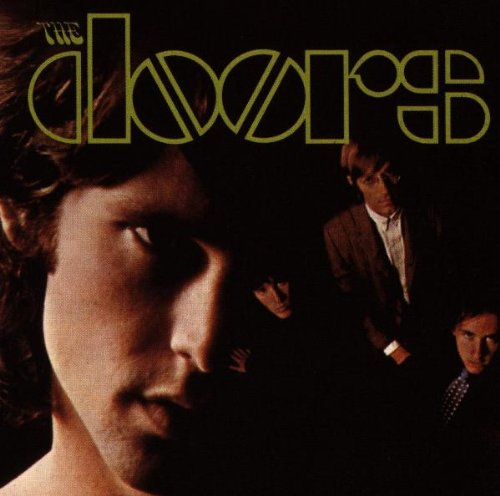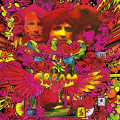Favourite Rock Albums from the late 60s and early 70s
I thought it would be interesting to highlight our favourite Rock albums from what many people (including those in their teens, twenties, thirties) regard as Rock's outstanding and most creative era.
I'll start with what I think is the best rock album of all time! "The Doors" s/t first album from 1967.
To quote All Music Guide, "A tremendous debut album, and indeed one of the best first-time outings in rock history, introducing the band's fusion of rock, blues, classical, jazz, and poetry with a knockout punch".
Would be interested to hear everybody else's favourites.

https://www.allmusic.com/album/the-doors-mw0000650088
Melbourne is back into compulsory mask wearing indoors from last night so will be wearing my "The Doors" first album matching mask and t-shirt in honour of this post!
I'll start with what I think is the best rock album of all time! "The Doors" s/t first album from 1967.
To quote All Music Guide, "A tremendous debut album, and indeed one of the best first-time outings in rock history, introducing the band's fusion of rock, blues, classical, jazz, and poetry with a knockout punch".
Would be interested to hear everybody else's favourites.

https://www.allmusic.com/album/the-doors-mw0000650088
Melbourne is back into compulsory mask wearing indoors from last night so will be wearing my "The Doors" first album matching mask and t-shirt in honour of this post!

Comments
Quoting All Music Guide, "Odessey and Oracle was one of the flukiest (and best) albums of the 1960s, and one of the most enduring long players to come out of the entire British psychedelic boom, mixing trippy melodies, ornate choruses, and lush Mellotron sounds with a solid hard rock base".
https://www.allmusic.com/album/odessey-and-oracle-mw0000192449
Before he went to LA produced a classic album.
Biff Rose
1969 Children Of Light 1970 Biff Rose
1972 Uncle Jesus, Aunty Christ
I had my first introduction to Bill Nelson on their 1974 album, but that was my pal's and I haven't located my cassette copy of it yet. Unlike my wife who neatly wrote out the artist, album & track names on those little inserts, I used a shorthand system that doesn't make a lot of sense. One of my million things to do after co-vid.
Still one of my favourite album covers.
1974 Axe Victim
1975 Futurama 1978 Drastic Plastic
However, when it comes to matching t-shirts and masks, it doesn't get much better than that ultimate classic album cover of "Forever Changes".
https://www.allmusic.com/album/da-capo-mw0000195829
Quoting AMG "The six songs that comprised the first side of this album when it was first issued are a truly classic body of work...".
https://www.allmusic.com/album/forever-changes-mw0000193671
And AMG again, ".. it became recognized as one of the finest and most haunting albums to come out of the Summer of Love....Forever Changes is inarguably Love's masterpiece and an album of enduring beauty, but it's also one of the few major works of its era that saw the dark clouds looming on the cultural horizon, and the result was music that was as prescient as it was compelling".
I just love the story behind the naming of the album and song, to quote AMG "With its endless, droning minor-key riff and mumbled vocals, "In-A-Gadda-Da-Vida" is arguably the most notorious song of the acid rock era. According to legend, the group was so stoned when they recorded the track that they could neither pronounce the title "In the Garden of Eden" or end the track, so it rambles on for a full 17 minutes, which to some listeners sounds like eternity. But that's the essence of its appeal -- it's the epitome of heavy psychedelic excess, encapsulating the most indulgent tendencies of the era".
so it’s pretty difficult to narrow it down to favorite rock albums of that time.
But, I do remember an early album that I had sent my grandmother out
to get because it was really a “must have” for me at the time (and continued
to be played incessantly afterwards). This was 1969. I’ve since read reviews
of the album where the reviewers either hated or just plain disliked the
lengthy drum solo. It was actually the highlight of the album for me and
I played just that part alone - also incessantly - more than any other part
of the album. I still think that it’s a brilliant display of a drummer actually
listening to the sound of his own drum set and constructing a percussive
composition right in the middle of a blues-rock song instead of just whaling
away at the skins in order to be flashy. Just two guys: organ/vocals and drums,
they were a powerhouse when seen live.
https://softmachine-moonjune.bandcamp.com/
P.S. Many thanks to @Brighternow and @rostasi for taking me back to the Small Faces “Ogden Nut Gone Flake” and Lee Michael s/t which are sitting ready to be played on my virtual turntable!
Bob Seger & The Silver Bullet Band
Recorded "Live"At Cobo Hall, Detroit, Michigan
-- September 4th & 5th, 1975
Live Bullet
AMG says “The Piper at the Gates of Dawn captures both sides of psychedelic experimentation - the pleasures of expanding one’s mind and perception, and an underlying threat of mental disorder and even lunacy.......ranks it as one of the best psychedelic albums of all time”
https://www.allmusic.com/album/the-piper-at-the-gates-of-dawn-mw0000191309
1968 The Beatles
The album that really introduced me to the best of creative, innovative and then so called “underground” rock was "The Rock Machine Turns You On”. This came out in 1968 at the extraordinary price of 14 shillings and 11 pence, half the price of a normal album. It was the first ever bargain priced sampler album.
It included great tracks from Bob Dylan, Spirit, Moby Grape, The Zombies, Blood Sweat & Tears, Electric Flag, Simon & Garfunkel, Leonard Cohen, The Byrds, Tim Rose, Taj Mahal, Peanut Butter Conspiracy, The United States of America, Roy Harper and Elmer Gantry’s Velvet Opera. It came out well before many of these groups/artists were even vaguely well-known. And what an embarrassment of riches!
And to quote Wikipedia “The Rock Machine Turns You On influenced a whole generation of music fans”.
I've got an LP, a CD, a de-luxe double CD and the Live Concert CD! (I do not recommend the last of these!)
I'm sure I'll add more! I'm still playing all of thee regularly
Another one I played a lot way back then. As a student I couldn't afford to buy full albums. This was the way to hear a range of rock music - no streaming then!!
(I have a history of that kind of thing - e.g. Pink Floyd comes to mind).
This was another one that I played a lot in the 70s. I used to use the track
"Basslich" behind my voice on the radio show back then.